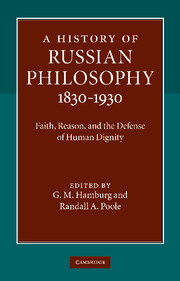Book contents
- Frontmatter
- Contents
- List of contributors
- Acknowledgments
- Introduction: The humanist tradition in Russian philosophy
- I The Nineteenth Century
- 1 Slavophiles, Westernizers, and the birth of Russian philosophical humanism
- 2 Alexander Herzen
- 3 Materialism and the radical intelligentsia: the 1860s
- 4 Russian ethical humanism: from populism to neo-idealism
- II Russian Metaphysical Idealism in Defense of Human Dignity
- III Humanity and Divinity in Russian Religious Philosophy after Solov′ëv
- IV Freedom and Human Perfectibility in the Silver Age
- V Russian Philosophy in Revolution and Exile
- Afterword: On persons as open-ended ends-in-themselves (the view from two novelists and two critics)
- Bibliography
- Index
1 - Slavophiles, Westernizers, and the birth of Russian philosophical humanism
Published online by Cambridge University Press: 05 June 2012
- Frontmatter
- Contents
- List of contributors
- Acknowledgments
- Introduction: The humanist tradition in Russian philosophy
- I The Nineteenth Century
- 1 Slavophiles, Westernizers, and the birth of Russian philosophical humanism
- 2 Alexander Herzen
- 3 Materialism and the radical intelligentsia: the 1860s
- 4 Russian ethical humanism: from populism to neo-idealism
- II Russian Metaphysical Idealism in Defense of Human Dignity
- III Humanity and Divinity in Russian Religious Philosophy after Solov′ëv
- IV Freedom and Human Perfectibility in the Silver Age
- V Russian Philosophy in Revolution and Exile
- Afterword: On persons as open-ended ends-in-themselves (the view from two novelists and two critics)
- Bibliography
- Index
Summary
INTRODUCTION
The purpose of this chapter is to analyze the philosophical significance of the famous dispute between the Westernizers and Slavophiles that occurred in the decade from the late 1830s to the late 1840s. The immediate pretext for this dispute was the 1836 publication of a “philosophical letter” by Pëtr Chaadaev (1794–1856), a thinker who argued that Russia had never belonged either to the West or to the East, that it lacked the traditions of these other civilizations, and that therefore “we [Russians] have not been touched by the universal education of the human race.” The young Aleksandr Herzen described Chaadaev's letter as a “pistol shot resounding in the dead of night,” a “pitiless cry of pain and reproach to Petrine Russia.” By the late 1830s, largely in response to Chaadaev's provocative letter, two intellectual parties took shape, each holding a different view of the historical-cultural differences between Russia and the West. After a time, these parties came to be known as the “Westerners” or “Westernizers” (zapadniki) and the “Slavophiles” (slavianofily). The Westernizers considered the differences between Russia and the West to be manifestations of Russia's cultural backwardness; they thought the paradigm of western civilization universal, and believed Russia's task was to adopt completely the western paradigm and to assimilate European culture along with it. By contrast, the Slavophiles held that the historical-cultural differences between Russia and the West indicated Russia's superiority and the radically different nature of Russian society and history.
Keywords
- Type
- Chapter
- Information
- A History of Russian Philosophy 1830–1930Faith, Reason, and the Defense of Human Dignity, pp. 27 - 51Publisher: Cambridge University PressPrint publication year: 2010
- 5
- Cited by

